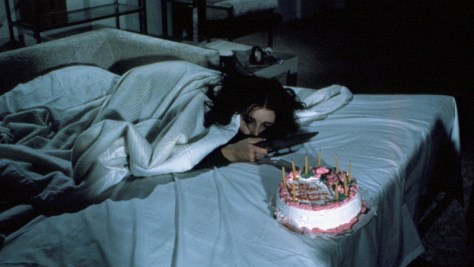
Format: Dual Format (DVD + Blu-ray)
Release date: 25 April 2016
Distributor: BFI
Director: José Ramón Larraz
Writers: José Ramón Larraz, Stanley Miller, Thomas Owen
Cast: Angela Pleasance, Peter Vaughan, Lorna Heilbron
UK, Belgium 1974
92 mins
Spanish director José Larraz’s take on the English ghost story is beautifully atmospheric and subtly disturbing.
‘I know everything that goes on in these woods. Many things go on in these woods.’ So says Helen (Angela Pleasence), a delicate, vulnerable seeming young woman whose wide-eyed gaze seems indicative of an innocence bordering on mania. She is staying in a mansion with her friend Anne, played by Lorna Heilbron with a sharp Mia Farrow in Rosemary’s Baby haircut. The other obvious Roman Polanski influence is Repulsion, as Helen’s feeble grip on reality begins to loosen and the story of a former friend Cora slowly unravels. All the while, Brady (Peter Vaughan), a beefy gamekeeper with Laurentian ambitions, lurks in the woods.
Spanish director José Larraz turns away from his earlier sexploitation style and produces that peculiarly English genre: the ghost story. Symptoms exists in the tradition of Don’t Look Now or, later, The Others, filled with painful memories, repressed desires and emotions and sudden messy violence. Like those films, it locates its core in human emotion and Larraz allows his characters time for their relationship to slowly evolve, as much through mutual quietness as dialogue. Both Helen and Anne need each other and there is genuine warmth, which never spends itself in lurid eroticism. This might be the beginning of a lesbian affair, or a deep friendship, or in fact both.
The gardens and woods, the river and pond are all filmed with a Kodachrome lustre, the sunlight glints from rivulets and river water dripping from dipping oars and through the branches of the trees that fragment it into shafts and yellow beams. The house itself is full of heavy furniture, but there are also mirrors that reflect the past as much as the present as well as knives and razors and an attic perfect for its very own Bertha Mason. There’s a kind of split personality to the way the camera moves as well. The meditative watching is constantly disturbed by the sudden cuts and movements, as if the eye must always search for something that just happened, a presence just departed.
As the denouement is reached, Larraz’s film confidently subverts without ever really surprising. There is a dread inevitability to the oddness that occurs and a sadness overlaying everything which mutes the horror, but also colours it effectively as if we are sleepwalking to our doom, destroying everything, including those we love, in our path. Although released as Britain’s entry to the Cannes Film Festival, Symptoms slipped away somehow and became a legendary lost film, on the BFI’s most wanted list of lost films as it happens, passed around by collectors in poor quality VHS versions. This new re-mastered print is deservedly pristine, highlighting the wonderful cinematography of Trevor Wrenn, who according to IMDb only photographed three films, all of them in 1974.
John Bleasdale

